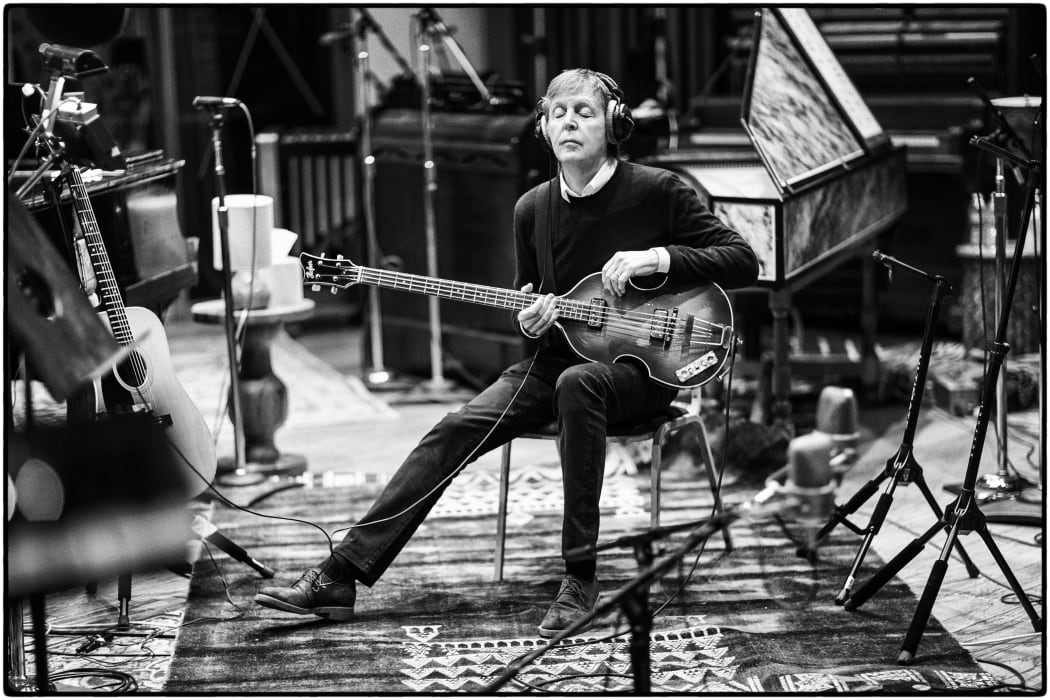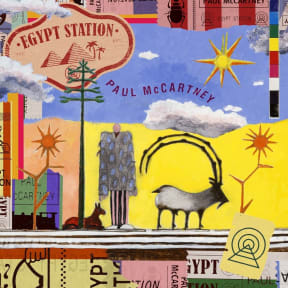Paul McCartney can't seem to stop writing songs. Nick Bollinger considers what his latest ones add to the best known songbook in pop.

Photo: MPL Communications
If Paul McCartney chose to stop making records and simply lean back on the best-known catalogue in pop, he might have an easier life.
Any new music McCartney makes is inevitably going to be compared with that hallowed catalogue, and how can you win when you’re competing with history, even if it’s your own?
McCartney might have been thinking about that when he wrote ‘Who Cares’, from his new album Egypt Station. The song is a kiss-off to anyone who makes you feel ‘like a rusty old wheel’. Then again, like so many of McCartney’s songs, the sentiment is universal enough that you could apply it to the situation of your choice.

Egypt Station Photo: supplied
It’s hardly the standout track, though it rocks satisfyingly enough. But ultimately it falls into the half of the record I expect I’ll have little urge to go back to after these first few listens. Why would I when I could always play Revolver?
At the other end of things, though, there are songs here that are more resonant at this point than one perhaps has any right to expect of the old Beatle.
‘I Don’t Know’ opens the album and it’s both comfortingly familiar and endearing in its vulnerability, the voice showing just a hint of its age as he worries about dogs at his door and birds of ill omen. That’s uncharacteristic of McCartney, who has always been one of the world’s great purveyors of musical optimism, but it’s one of a couple of moments on the new album where he takes one of his darker thoughts and holds it under a light.
Songs like these may be no more sophisticated than the best ones he wrote in his twenties, but it’s the unforcedness of them, the feeling that he just picked up a guitar or sat down at the piano and the song fell out, that makes them so easy to listen to.
That’s the introspective side of Egypt Station - my favourite part really - and that’s by no means the tone of the whole album. As he’s shown us before, McCartney sometimes likes to dally with the exotic, but ‘Back In Brazil’ borders on kitsch.
Then there’s the side of McCartney that has always needed to assert his credentials as one of the world’s great writers of pop hits; that does want to compete with his own history. But great as those old Beatles records still sound - or as effective a disco move like ‘What The Man Said’ was for Wings in 1975 - a hit in this era has to sound like a hit of this era.
To that end he’s teamed up with one of the biggest hitmakers in contemporary pop, Greg Kurstin: the production wizard behind blockbusters for Adele, Lily Allen and Pink, among others. More subtle than that other modern pop mastermind Max Martin, Kurstin has brought the contemporising touch of the digital native while still allowing McCartney to do all the things he does best.
Though he hasn’t had a hit single in three decades, McCartney’s pop ambitions for this record might be reflected in the enthusiasm with which he’s been promoting it, even submitting to a Carpool Karaoke, in which he cleverly contrived to get James Corden singing along to ‘Come On To Me’ as though it was some Beatles classic he’d known all his life. It’s an earworm all right, though that’s not necessarily a good thing, especially as I now see James Corden in my mind’s eye, bobbing up and down with that look of inane self-satisfaction, every time I hear it. It’s also one of at least two songs here that evince a randiness that, coming from the 76-year-old songwriter, some might consider unseemly.
The other one is ‘Fuh You’. Based around a line he intends us to think we heard while he actually sings something subtly different, that’s the one track here Kurstin didn’t produce. ‘Fuh You’ was produced and in fact co-written by One Republic frontman and hitmaker Ryan Tedder, and with one of those choruses that are-twice-as-big-as-the-pre-chorus-that-came-before-it-which-was-fuh-big-anyway, it’s the most shameless bid McCartney’s made in a while for modern pop domination.
I can only admire both Tedder and McCartney for the scale of their ambition and their undeniable ability to craft a hook, even if I have little desire to hear it again. But if that song suggests McCartney has a paucity of things to actually say, that becomes even more apparent when he gets serious, as he does in a song called ‘People Want Peace’.
It’s all the lonely people meets give peace a chance, welded to a serviceable McCartney melody, but somehow adding up to less than the sum of its intentions. And there’s a similarly vague gesture towards some sort of global awareness on ‘Despite Repeated Warnings’. I’ve seen Americans interpret that as a Trump analogy and Britons relate it to Brexit, which shows how amorphous the lyric really is, though again the music pulls it through, including some great bass playing. In fact as a piece of music it sustains itself for nearly seven minutes as it moves through several distinct passages, in a way McCartney pioneered with songs like ‘You Never Give Me Your Money’, ‘Uncle Albert’ and ‘Band On The Run’.
This epic tendency culminates in a closing medley that refers back to the second side of Abbey Road.
Paul McCartney doesn’t need to be making new music at all. He just can’t help it. The stuff still pours out of him, good, bad and indifferent. This time around Greg Kurstin has helped ensure that at least half of it has turned out pretty damn good. If Egypt Station doesn’t really add anything to McCartney’s legacy, he must know that at this point nothing he does can detract from it either.

